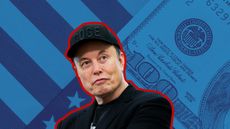Entrepreneurs
The latest news, updates and opinions on Entrepreneurs from the expert team here at MoneyWeek
-

What is Anant Ambani’s net worth?
Anant Ambani is the son of Asia’s richest man. His grand wedding garnered worldwide attention in 2024. What is his net worth?
By Oojal Dhanjal Last updated
-

What is Elon Musk's net worth?
Elon Musk is the richest person in the world and close to becoming the first-ever trillionaire. How did the Tesla and SpaceX founder make his fortune?
By Oojal Dhanjal Last updated
-

The most influential people of 2025
Here are the most influential people of 2025, from New York's mayor-elect Zohran Mamdani to Japan’s Iron Lady Sanae Takaichi
By Jane Lewis Published
-

Luana Lopes Lara: The ballerina who made a billion
Luana Lopes Lara trained at the Bolshoi, but hung up her ballet shoes when she had the idea of setting up a business in the prediction markets. That paid off
By Jane Lewis Published
-

Christopher Harborne: Reform UK donor and crypto billionaire
Christopher Harborne came into the spotlight when it emerged he had given £9 million to Nigel Farage's Reform UK. How did he make his millions?
By Jane Lewis Published
-

Chen Zhi: the kingpin of a global conspiracy
Chen Zhi appeared to be a business prodigy investing in everything from real estate to airlines. Prosecutors allege he is the head of something more sinister
By Jane Lewis Published
-

Jared Isaacman: SpaceX astronaut and Trump's pick for NASA
Jared Isaacman is a close ally of Elon Musk and the first non-professional astronaut to walk in space. Now, he is in charge of NASA
By Jane Lewis Published
-

Defeat into victory: the key to Simon Wolfson's success
Opinion Next CEO Simon Wolfson claims he owes his success to a book on military strategy in World War II. What lessons does it hold, and how did he apply them to Next?
By Max King Published
Opinion -

'Why I launched MoneyWeek'
Inspired by The Week and uninspired by the financial press, Jolyon Connell decided it was time for a new venture. That's where MoneyWeek came in
By Jolyon Connell Published
